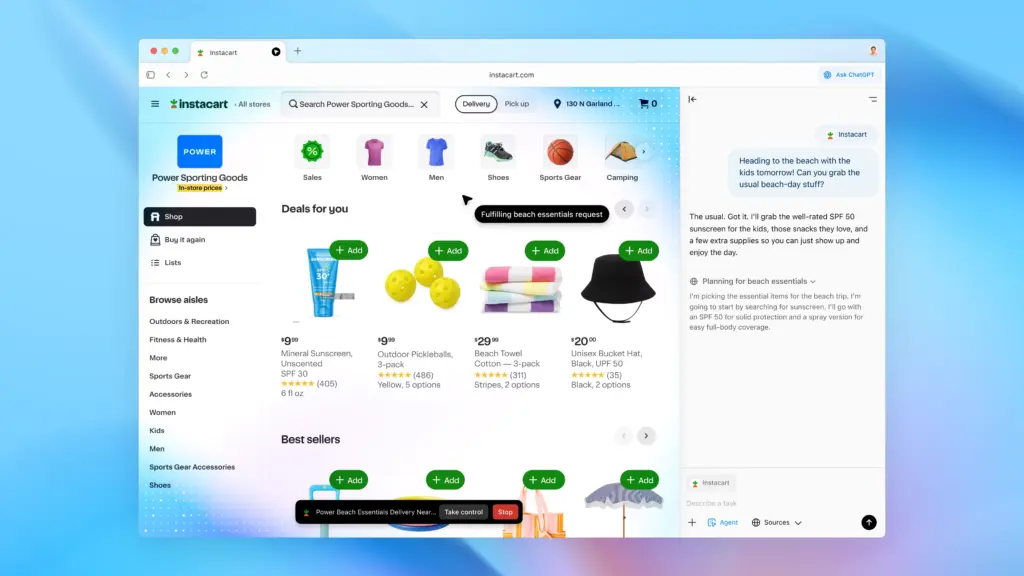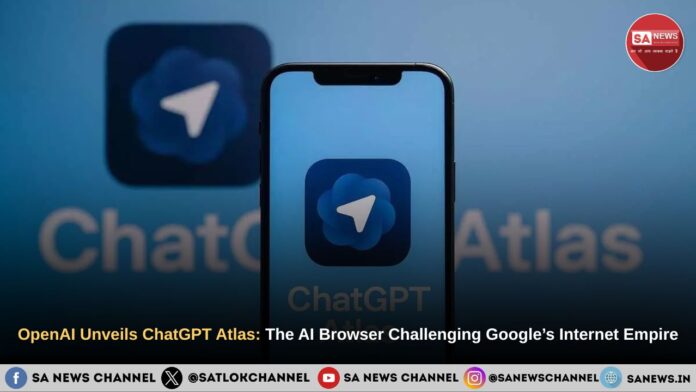In a bold step toward reshaping how people use the internet, OpenAI has launched ChatGPT Atlas, an AI-powered browser that seamlessly blends search, automation, and conversation. Announced during a global livestream, Atlas integrates ChatGPT directly into the browsing experience, enabling users to chat with web pages, summarize information instantly, and even perform online tasks automatically.
Available worldwide for macOS, with Windows, iOS, and Android support coming soon, Atlas marks OpenAI’s most ambitious attempt yet to rival Google Chrome. With built-in memory, customizable privacy controls, and a new “agent mode”, Atlas aims to transform everyday browsing into a truly intelligent experience.
Key Takeaways: OpenAI’s ChatGPT Atlas Browser Redefines Modern Web Experience
- Global Launch: Atlas is now live on macOS; support for Windows, iOS, and Android will follow soon.
- Integrated AI Companion: ChatGPT is embedded into the browser, allowing real-time conversations alongside web content.
- Agent Mode: Lets users automate tasks from booking flights to editing documents ; available initially for Plus, Pro, and Business users.
- Smart Memory: Atlas remembers browsing context and previous interactions to offer personalized results and assistance.
- Privacy Control: Users can view, archive, or delete memories, browse incognito, and toggle site visibility.
- Safety First: The agent cannot run code, install extensions, or access other apps, ensuring data integrity and user security.
- Competitive Edge: Positioned to challenge Google Chrome, Microsoft Edge, and Perplexity’s Comet in the growing AI browser market.
ChatGPT Atlas : OpenAI Steps into the Browser Wars
After months of speculation, OpenAI officially revealed ChatGPT Atlas during a livestream led by CEO Sam Altman. The announcement followed a teaser video showing browser tabs flashing across a blank screen hinting at an all-new internet experience. Altman described Atlas as a major milestone in how humans interact with information online, envisioning “a chat-based web experience” as the next evolution of browsing.
OpenAI’s leadership team included Will Ellsworth (post-training research), Adam Fry (product lead for ChatGPT Search), Ben Goodger (engineering lead and former developer of Google Chrome and Firefox), Ryan O’Rouke (interface designer), Justin Rushing (former Apple employee), and Pranav Vishnu. Together, they presented Atlas as a platform that merges design simplicity with deep AI capability.
ChatGPT Atlas : Built with ChatGPT at Its Core
Unlike conventional browsers, Atlas is built around ChatGPT itself. Users can open a split-screen layout where the webpage appears on one side and a live ChatGPT thread on the other. This sidecar experience enables users to ask follow-up questions, summarize articles, and refine emails ; all without switching tabs or copying text.
Product lead Adam Fry highlighted Atlas’s most powerful innovation: “browser memory.” This feature allows ChatGPT to remember what websites a user has visited, what queries they’ve asked, and what documents they’ve interacted with , creating a contextual, personalized browsing environment.
https://openai.com/index/introducing-chatgpt-atlas/?video=1129227761
For those concerned about privacy, OpenAI emphasized that all memories are optional and can be managed directly in settings. Clearing browsing history removes all associated memories, ensuring full transparency and user control.
ChatGPT Atlas Agent Mode: When ChatGPT Takes Action
One of the defining aspects of ChatGPT Atlas is its agent mode, a capability that allows the AI to act within the browser on a user’s behalf. This includes booking reservations, researching data, summarizing reports, or organizing emails.
The feature builds on OpenAI’s previous experimental tools like Operator and ChatGPT Agent, but Atlas integrates it natively, making automation faster and more intuitive. Currently, agent mode is accessible only to ChatGPT Plus, Pro, and Business subscribers, with broader access planned later.
OpenAI stressed that safety remains a top priority. Agent mode cannot execute code, download files, or interact with system applications. The AI pauses automatically when operating on sensitive websites such as financial portals, requiring explicit user confirmation.
ChatGPT Atlas : Privacy, Security, and Parental Controls
OpenAI introduced extensive privacy measures in Atlas to build user trust. By default, browsing data is not used for model training unless a user opts in. Users can also select which sites ChatGPT can “see” using an address-bar toggle.

The browser includes parental control settings, allowing families to disable memory or agent mode entirely. For institutional use, Business, Enterprise, and Edu administrators can manage permissions through the organization’s plan dashboard.
As OpenAI detailed, “Your ChatGPT memories are private to your account and under your control.” This design choice aligns with the company’s broader commitment to transparency and safety in AI deployment.
ChatGPT Atlas : Competing in a Crowded AI Browser Market
The debut of ChatGPT Atlas intensifies the ongoing AI browser race. Rivals such as Perplexity’s Comet and The Browser Company’s Dia have already attempted to integrate AI companions into everyday web navigation.
Also Read: OpenAI Introduces ChatGPT Go in India: Affordable AI Access at Just ₹399/Month
Meanwhile, Google continues embedding its Gemini AI into Chrome, promising features like auto-booking appointments and handling routine tasks. Microsoft Edge similarly leverages OpenAI’s own models within its Copilot framework.
However, Atlas stands out by merging all these functions into one cohesive ecosystem, directly tied to the existing ChatGPT platform, an advantage neither Chrome nor Edge can replicate natively.
ChatGPT Atlas :Designed for Productivity and Everyday Use
OpenAI’s early testers, including college student Yogya Kalra, praised Atlas for its ability to streamline research and study workflows. “I used to switch between slides and ChatGPT,” Kalra noted. “Now ChatGPT instantly understands what I’m looking at.”
This efficiency extends to professional environments as well. In demonstration, OpenAI showed how Atlas could draft team briefs, summarize documents, or even organize online shopping lists all from a single browser window.
With import tools for bookmarks, passwords, and browsing history, migrating from an existing browser takes only minutes, making Atlas ready for immediate everyday use.
What Lies Ahead for ChatGPT Atlas
OpenAI confirmed that this is just the beginning for its AI-driven browser. The upcoming roadmap includes multi-profile support, enhanced developer tools, and expanded visibility for third-party apps built through the ChatGPT Apps SDK.
Website developers are encouraged to add ARIA tags to improve how ChatGPT Agent interprets their pages, a sign that OpenAI aims to make Atlas an open platform rather than a closed ecosystem. Frequent updates and release notes will accompany every improvement as the company refines speed, reliability, and safety.
ChatGPT Atlas : A New Chapter in How We Use the Web
With ChatGPT Atlas, OpenAI is signaling a clear vision: a future where the web is no longer a static tool but an interactive partner. By combining memory, conversation, and automation, Atlas transforms the browser from a passive portal into an active digital assistant.

While its success against giants like Google Chrome will depend on adoption, innovation, and trust, the launch of Atlas marks a defining moment in the evolution of web technology, one that could forever change how humans and machines share the internet.
Discovering the Spiritual Wisdom Behind Human Innovation
Artificial Intelligence may revolutionize how we work, think, and explore but it can never help us to achieve salvation. Only humans, created by God, possess the divine essence capable of attaining liberation. AI is human-made, while humans are God-gifted creations. Therefore, AI must be used judiciously ; as a tool to spread true spiritual knowledge, not to replace it.
If used rightly, AI can help share the eternal wisdom of Tatvdarshi Sant Rampal Ji Maharaj, awakening souls to the truth of creation and the real path to salvation. Through this knowledge, people can free themselves from the endless cycle of birth and death. One day, this world and all its technology will perish, but the soul’s journey continues.
Technology is valuable, but it has its limits. The true purpose of human life is not to become slaves of machines but to recognize our Creator and attain the supreme goal salvation.
For true spiritual enlightenment, visit www.jagatgururampalji.org and watch the spiritual discourses of Sant Rampal Ji Maharaj on YouTube.
FAQs on OpenAI’s ChatGPT Atlas Browser
1. What is OpenAI’s ChatGPT Atlas Browser?
ChatGPT Atlas is OpenAI’s new AI-powered browser integrating real-time web access, designed to enhance accuracy, browsing, and research directly within ChatGPT.
2. When will ChatGPT Atlas be available for users?
OpenAI has begun a phased rollout of ChatGPT Atlas for selected users, with broader public access expected soon after initial testing.
3. How is ChatGPT Atlas different from Google Gemini or Microsoft Copilot?
Unlike Gemini or Copilot, ChatGPT Atlas integrates live web browsing, personalized safety layers, and seamless in-app content generation.
4. Does ChatGPT Atlas focus on user safety and data protection?
Yes, OpenAI emphasizes transparency, secure data handling, and improved privacy through advanced safety systems in ChatGPT Atlas.
5. Can ChatGPT Atlas replace traditional browsers like Chrome?
While innovative, ChatGPT Atlas complements existing browsers, offering AI-assisted search and productivity tools rather than replacing Chrome or Edge completely.




